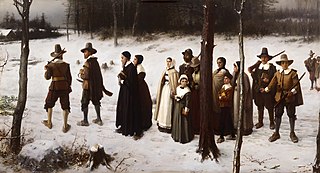
Presbyterianism is a Reformed (Calvinist) Protestant tradition named for its form of church government by representative assemblies of elders. Other Reformed churches are organised in a similar way, but the word Presbyterian, when capitalized, is applied to churches that trace their roots to the Church of Scotland or to English Dissenter groups that formed during the English Civil War.

Congregational churches are Protestant churches in the Reformed (Calvinist) tradition practicing congregational government, in which each congregation independently and autonomously runs its own affairs.
The Confessing Movement is a largely lay-led theologically conservative Christian movement that opposes the influence of theological liberalism and theological progressivism currently within several mainline Protestant denominations and seeks to return them to its view of orthodox doctrine, or form a new denomination and disfellowship (excommunicate) them if the situation becomes untenable. Those who eventually deem dealing with theological liberalism and theological progressivism within their churches and denominations as not being tenable anymore would later join or start Confessional Churches and/or Evangelical Churches that continue with the traditions of their respective denominations and maintaining orthodox doctrine while being ecclesiastically separate from the Mainline Protestant denominations.
In Anglican Christianity, low church refers to those who give little emphasis to ritual. The term is most often used in a liturgical sense, denoting a Protestant emphasis, whereas "high church" denotes an emphasis on ritual, often Anglo-Catholic.

A united church, also called a uniting church, is a denomination formed from the merger or other form of church union of two or more different Protestant Christian denominations, a number of which come from separate and distinct denominational orientations or traditions. Multi-denominationalism, or a multi-denominational church or organization, is a congregation or organization that is affiliated with two or more Christian denominations, whether they be part of the same tradition or from separate and distinct traditions.

The Gutnius Lutheran Church, formerly the Wabag Lutheran Church, is a Lutheran body existing in Papua New Guinea. Gutnius means "Good News" in Tok Pisin. It was established by the Lutheran Church–Missouri Synod in 1948, shortly after the Australian administration of the Territory of Papua and New Guinea permitted missionary activity to spread into the western highlands. The church counts 125.000 parishioners, largely confined to Enga Province in the western highlands. It operates Immanuel Lutheran Hospital and St. Paul's Lutheran Secondary School (Pausa) at Wapenamanda, Enga Province. The church has other health and educational institutions as well.
The Wesleyan Methodist Church of Australia is a Christian denomination with its origins in Wesleyan Methodism. It is the organisational name for contemporary The Wesleyan Church in Australia.

The Evangelical Lutheran Church of Papua New Guinea is a Protestant church denomination located in Papua New Guinea that professes the Lutheran branch of the Christian faith. The Church is incorporated by a 1991 Act of the Parliament of Papua New Guinea and it has a baptized membership of approximately 900,000 members.

The Christian Conference of Asia is a regional ecumenical organisation representing 15 National Councils and over 100 denominations (churches) in New Zealand, Australia, Bangladesh, Burma, Cambodia, East Timor, Hong Kong, India, Indonesia, Laos, Japan, Korea, Malaysia, Pakistan, Philippines, Sri Lanka, Taiwan and Thailand.
Protestantism in Puerto Rico officially was introduced in 1872 when the first Protestant church in the Anglican tradition was established on the island. Before the islands of Puerto Rico came under United States sovereignty in 1898, Protestantism was suppressed under Roman Catholic Spanish rule.

The Anglican Church of Papua New Guinea is a province of the Anglican Communion. It was created in 1977 when the Province of Papua New Guinea became independent from the Province of Queensland in the Church of England in Australia following Papua New Guinea's independence in 1975.

Lutheranism is present on all inhabited continents with an estimated 80 million adherents, out of which 74.2 million are affiliated with the Lutheran World Federation. A major movement that first began the Reformation, it constitutes one of the largest Protestant branches claiming around 80 million out of 920 million Protestants. The Lutheran World Federation brings together the vast majority of Lutherans. Apart from it, there are also other organisations such as the International Lutheran Council and the Confessional Evangelical Lutheran Conference, as well as multiple independent Lutheran denominations.

Protestantism in Brazil began in the 19th century and grew in the 20th century. The 2010 Census reported that 22.2% of the Brazilian population was Protestant, while in 2020 the percentage was estimated to have risen to 31% of the population, over 65 million individuals, making it the second largest Protestant population in the Western world.
The Kiribati Uniting Church (KUC) is a united Protestant Christian denomination in Kiribati. With approximately 25,000 members, and 136 congregations, the KUC is the second-largest religious group in Kiribati and accounts for approximately 21 percent of the population of the country.

In Christianity, the ordination of women has been taking place in an increasing number of Protestant and Old Catholic churches, starting in the 20th century. Since ancient times, certain churches of the Orthodox tradition, such as the Coptic Orthodox Church, have raised women to the office of deaconess. While ordination of women has been approved in many denominations, it is still a very controversial and divisive topic.

Protestantism is the largest grouping of Christians in the United States, with its combined denominations collectively comprising about 43% of the country's population in 2019. Other estimates suggest that 48.5% of the U.S. population is Protestant. Simultaneously, this corresponds to around 20% of the world's total Protestant population. The U.S. contains the largest Protestant population of any country in the world. Baptists comprise about one-third of American Protestants. The Southern Baptist Convention is the largest single Protestant denomination in the U.S., comprising one-tenth of American Protestants. Twelve of the original Thirteen Colonies were Protestant, with only Maryland having a sizable Catholic population due to Lord Baltimore's religious tolerance.














